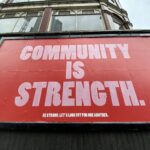This post is about the persistent push in America for white supremacy and how people of faith respond to this cycle at any time, especially during a national election. This has been among the hardest posts I have written. The subject is complex, full of emotion and divided views and there are no obvious answers. So I am asking the readers of Critical Conversations and any friends or colleagues you think might add to this discussion to help shape an important conversation about what’s at stake in our upcoming national election and how we individually and collectively respond.
For me, I don’t see a simple way to connect my faith, my being a white male, my political views and my work to resist and end racism and racial inequality in my community and nation. I imagine there are people who have already made these connections and have a lot to share. I know there are people of most faiths working as anti-racists to advance racial equity. I know there are political organizers and parties working to reach all Americans and make a case for how candidates advance justice and good for all. What is not clear is how to connect my identity as a white Christian with my values and my politics and the upcoming election.
It is painful as a white person to admit that from our nation’s birth until today, there has been a battle over who will have power, influence, and rights in America. As a white Christian, I am concerned that 50% of white Christians voted for and allege to support former President Trump and his policies and values. The purpose of this post is to ask myself and other white people of faith and white Christians particularly, what is ours to do to push back and offer a counterbalance to this large white Christian support for policies that appear contrary to Christian values? More specifically, how does our faith guide our involvement or disengagement in our national election for President and government leaders?
A recent PBS special on the Kerner Report reminded me how ongoing and cyclical the battle to keep white control of America is. This independent report following Martin Luther King Jr.’s assassination and the civil unrest in 1968 showed very clearly the underlying cause of civil disorders was racist policies that limited Black opportunities. Discriminatory lending practices and housing, unequal education and employment opportunities were called what they were and are: structural racism.
President Johnson who enthusiastically appointed the Commission rejected the report and its findings. Richard Nixon became president and the message quickly shifted back to blaming Black people for poverty and the conditions in urban areas. Forty years later, Barack Obama was elected president and there was again hope for progress for a short time. White resistance grew and Donald Trump was elected in 2016. George Floyd was murdered by a policeman in 2020 and for a short time, there was action for change. Four years later, the pushback from white desire for power is stronger than ever.
We now face another national election where former President Trump and his followers are aggressively mounting a race-based campaign aimed at preserving white power and pushing back any advancements in racial equity.
What I don’t know is how to answer my friend Adar Ayira’s question in her post last month. She wrote about the number of White Christians supporting Donald Trump and White Supremacist positions. She asked where is the counterbalance from white Christians (and for me all whites of faith) who believe in a racially just society based on Jesus’s simple instruction to “love one another”?
And as Adar reminded me in a recent discussion, this is not about Donald Trump or what happens over the next four years. The central issue is about expanding the base of people working every day to end racism in America. It is about acting as if someday we can end the battle to hold onto white control of America and our cycles of short periods of modest progress followed by organized persistent actions to maintain white power.
And as a May 25, 2024, Washington Post Perspective article Four Years Later, Has the Racial-Justice Movement Lost the Fight? points out: “ Pessimism is the ultimate American privilege. It is the feeling held most easily by those whose lives would still be functional, and maybe even satisfactory, if nothing changed.” To fully engage in this battle for justice, white people like you and me need to stay engaged in both seeing and understanding how prevalent racism is and noticing how we are complicit with it both by silence and by actions.
So. I am not sure how to communicate about this topic or what to do or not do. I am concerned like a lot of people that this election could further reduce racial equity. I think we need to make it clear there are a lot of white people not for racist policies and candidates who advocate them.
I invite you to use the comment feature on this post or email me at tom@thadams.com if you know of white people of faith working for racial justice focused on the upcoming election. if you’d like to join me for a discussion of this topic at Racial Justice Conversations on Zoom on Wednesday, June 5 at 5 p.m. Eastern, email me for details. My hope is that this inquiry and discussion will result in ideas that I and others can share here and elsewhere as we put the values of our faith into action to advance racial equity in America between now and November 5 and thereafter.




0 Comments